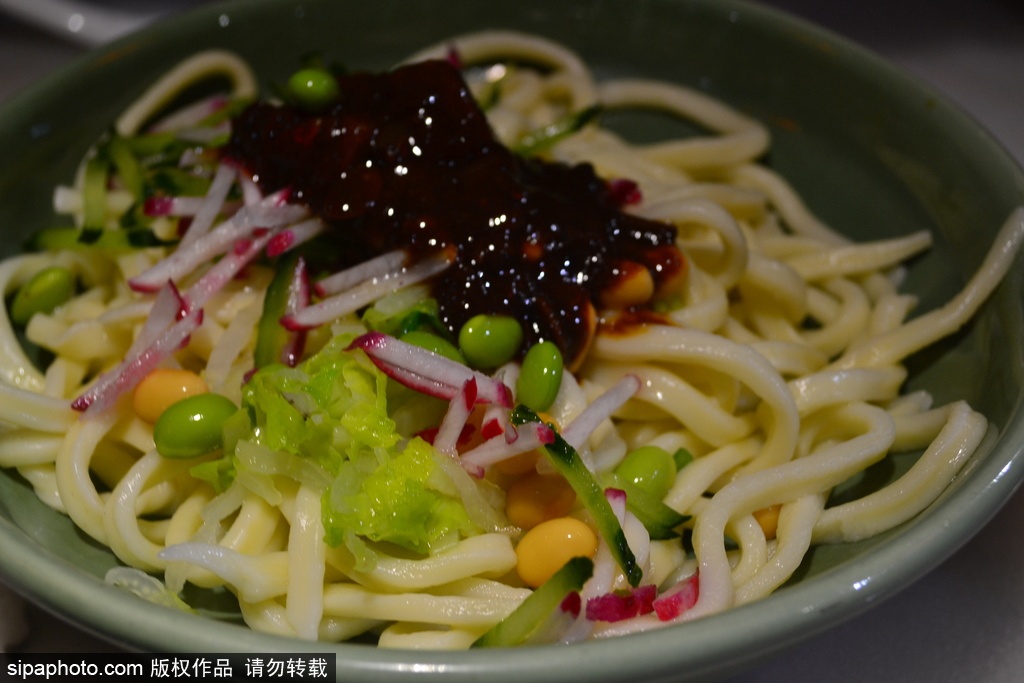
Characteristics: The minced pork in this dish smells fragrant, while the noodles are nicely chewy. The addition of healthy green vegetables really makes your mouth water.
Noodles with Minced Pork, also being called Zha Jiang Mian by Chinese people, was originally a local specialty of Beijing. Later, it spread throughout China and evolved into many regional varieties. However, the main ingredients still remain as the recipe shows: hand-made noodles, minced pork sauce or bean sauce and fitting vegetables like green vegetables and bean sprouts.
Origin
Zhajiangmian originate from Shandong province and is an iconic Northern Chinese dish. It is unknown how the dish came to be and only a few folktales are available.
Spread of vegetarian Zhajiangmian to Beijing
During the Guangxu era of the Qing dynasty, after the Eight-Nation Alliance invaded China and conquered Beijing, the Empress Dowager Cixi, Emperor Guangxu and their retinues were forced to retreat from Beijing to Xi'an. On their way, the Imperial Eunuch, Li Lianying detected a pleasant aroma, and found that the smell came from a zhajiangmian restaurant. He then reported about the restaurant to Cixi and Guangxu. Due to collective fatigue and hunger after their long trip, Cixi and Guangxu decided to have a meal in the restaurant. Li Lianying ordered a bowl of vegetarian zhajiangmian. Finding it tasty, they ordered another one. After dinner, Cixi asked everyone how they found the taste of the dish. They all replied "This is definitely a good noodle. Good, good!" Shortly after, as Emperor Guangxu was about to leave and continue their trip, Cixi demanded that Li Lianying bring the chef who made the zhajiangmian to Beijing and the palace, so they could eat zhajiangmian often once they came back. This is the story of how the vegetarian zhajiangmian made its way to Beijing.
Analysis of the subjective factors such as Beijing city development in Qing and Ming dynasties, food supply, climate, people' s living conditions comes to a conclusion that Bean Paste Noodles and Old Beijing Noodles with Fried Bean Sauce occurred at the same time. The symbolic sign "Old Beijing Noodles with Fried Bean Sauce "is hidden but rich in profound cultural connotation.
Famous Restaurant
>Shunxinzhai Beijing Noodles with Soybean Paste(顺心斋)The noodles with soybean paste is a home-style dish of Beijing. It is said that Shunxinzhai Beijing Noodles with Soybean Paste provides Noodles with Soybean Paste with traditional flavor. The Noodles with Soybean Paste of the restaurant boasts various vegetables such as shredded cucumber, shredded sweet pink-fleshed radish, bean sprouts, celery, Chinese toon and soybeans, so as to satisfy the different tastes of people. The dish also boasts its chewy noodles made by chef at the entrance and delicious soybean paste featuring an integration of dry soybean paste, sweet sauce and minced meat with both fat meat and lean meat.
Address: No. 40, Shuiyuan Wuchang, Huajiadi Community
This is a Beijing cuisine restaurant with noodles with bean paste as its specialty. The noodles don’t have many tastes to choose from but just the classical ones. The bean paste is good, with large amount of delicious meat. It also serves various kinds of characteristic, inexpensive Beijing snacks. Travelers must come here to have a try.
Address: 6/F, North Part, Beijing Department Store, No. 255 Wangfujing Street
>No. 69 Fangzhuanchang Hutong Noodles (69号方砖厂胡同)At the front of a noodle restaurant nestled in Fangzhuanchang Hutong, stands a long queue of guests thirsting for the homemade Zhajiangmian (noodles with soybean paste).
A big bowl of noodles are covered with shredded cucumber and cabbage and cooked soybeans. You will be also served with a small bowl of authentic soybean paste containing a sight of diced meat, whose strong fragrance is enough to lick your chops. Chewy noodles, with fragrant soybean paste, refreshing vegetables and well-marbled meat, will make you lick your lips.
Address: No. 1, Fangzhuanchang Hutong
>Yiwanju Restaurant (一碗居)Yiwanju, or “One bowl”, is a restaurant specializing in Beijing snacks. With a history of over 21 years, the Yiwanju restaurant located in Fengtai district attracts customers not only for its food but also for its unique decorations. The restaurant located in Fangzhuang District also gives a opera performance in the evening.
Address: No 24-1 Pufang Road
Tel:010-67654321
>Laoshe Tea House(老舍茶房)Lao She Teahouse, built in 1988, is a unique place in Beijing showing the entertainments of old Beijing people in old times. It was named after the famous writer—Lao She.
Everyday visitors from various places around the world who like Chinese ancient cultures and arts come here to appreciate brilliant programs such as traditional opera, cross talk, two-man comic show and story-telling in Beijing dialect with drum accompaniment. By watching these, they can explore Chinese folk arts and amorous feelings.
In such liveliness and noisy limited space with deafening sound of drums, everyone has a kettle of good tea, companied with several tasteful Beijing snacks, watching hard performances on the stage attentively.
Address: Bldg 3, Qianmen Xidajie, Xuanwu District, Beijing



